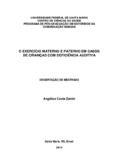| dc.creator | Zanini, Angélica Costa | |
| dc.date.accessioned | 2015-02-25 | |
| dc.date.available | 2015-02-25 | |
| dc.date.issued | 2014-03-31 | |
| dc.identifier.citation | ZANINI, Angélica Costa. THE PATERNAL AND MATERNAL ROLE IN CASES OF CHILDREN WITH HEARING IMPAIRMENT. 2014. 98 f. Dissertação (Mestrado em Fonoaudiologia) - Universidade Federal de Santa Maria, Santa Maria, 2014. | por |
| dc.identifier.uri | http://repositorio.ufsm.br/handle/1/6569 | |
| dc.description.abstract | This study aims to know how works the paternal and maternal role of children with hearing impairment . As well as, it has analized if there is any difficulty in the development of those roles, and this way to know the parent s view about hearing loss. The research was qualitative, contemporary, cross and aplied character. It was carried out at SAF (Speech -Language Service at UFSM( Federal University of Santa Maria ) . From 23 children who have been seen at Habilitation and Rehabilitation Sector. It was conducted interviews with parents of 13 children, totaling 15 interviewed. Of those, there were 10 mothers, 4 fathers, and one grandmother. Most interviews were conducted only with mothers because most fathers did not want to be part of the study. They were semi-structured interviews , the ones were recorded and later transcribed. Data were analyzed from the perspective of Bardin (1977). The parents received the feedback of each interview. As result, it was realized certain difficulties of some parents in performing their respective roles. It was verified that some fathers, mothers and caregivers did not support their roles facing the difficulty of dealing with a child with hearing impairment, because it is not the image of the ideal child. It was noticed that the biggest problem was about the failure in mother role, because she neither has played her role nor has allowed that the father has had a role in mother and child relationship. Some parents have difficulty in set limit. About hearing loss results indicate that most parents clash with the diagnosis and react according to their psychological resources and elaboration mourning, as denying it. In conclusion it is expected that new studies are conducted involving a connection between Speech Language Therapy and Psychology in relation to theme. | eng |
| dc.format | application/pdf | por |
| dc.language | por | por |
| dc.publisher | Universidade Federal de Santa Maria | por |
| dc.rights | Acesso Aberto | por |
| dc.subject | Surdez | por |
| dc.subject | Deficiência auditiva | por |
| dc.subject | Família | por |
| dc.subject | Pai | por |
| dc.subject | Mãe | por |
| dc.subject | Deafness | eng |
| dc.subject | Hearing loss | eng |
| dc.subject | Family | eng |
| dc.subject | Father | eng |
| dc.subject | Mother | eng |
| dc.title | O exercício materno e paterno em casos de crianças com deficiência auditiva | por |
| dc.title.alternative | The paternal and maternal role in cases of children with hearing impairment | eng |
| dc.type | Dissertação | por |
| dc.description.resumo | Este estudo teve por objetivos conhecer como ocorre o exercício paterno e materno diante de crianças com deficiência auditiva; investigar se há dificuldades no desempenho desses exercícios; assim como conhecer a visão dos pais (pais e mães) em relação à deficiência auditiva. A pesquisa teve caráter qualitativo e foi realizada no Serviço de Atendimento Fonoaudiológico, no Setor de Habilitação e Reabilitação Auditiva da Universidade Federal de Santa Maria, RS. Em um total de 23 crianças atendidas, no Setor de Habilitação e Reabilitação Auditiva, foram realizadas entrevistas com os pais de 13 dessas crianças, totalizando 15 entrevistados, constituídos por 10 mães, 4 pais e uma avó. A maioria das entrevistas foi realizada somente com as mães, a partir da baixa adesão de outros pais ao estudo. As entrevistas foram do tipo semiestruturadas, gravadas e, posteriormente, transcritas na íntegra. Os dados foram analisados, segundo a análise de conteúdo de Bardin. Os pais receberam uma devolução ao final de cada entrevista. Como conclusão, perceberam-se certas dificuldades de alguns pais, tanto o pai quanto a mãe, em realizar seus exercícios enquanto pais e mães. Percebeu-se que alguns pais, mães e cuidadores não conseguiram sustentar seus papéis diante da dificuldade de lidar com um filho com deficiência auditiva, figura a qual foge ao perfil do filho imaginado. Nesse contexto, há maior problemática no que diz respeito ao lugar da mãe, seja por não ocupar seu lugar, ou por não permitir a entrada do pai na relação mãe e filho. Alguns pais têm dificuldade na colocação de limites. Quanto à deficiência auditiva, os resultados apontam que muitos dos pais entraram em choque com o diagnóstico da deficiência auditiva e reagiram conforme seus recursos psíquicos à elaboração do luto, como, por exemplo, negando. Diante de tais conclusões, espera-se que novos trabalhos sejam realizados envolvendo a interface Fonoaudiologia e Psicologia em relação à temática. | por |
| dc.contributor.advisor1 | Kessler, Themis Maria | |
| dc.contributor.advisor1Lattes | http://buscatextual.cnpq.br/buscatextual/visualizacv.do?id=K4703628Z5 | por |
| dc.contributor.referee1 | Smeha, Luciane Najar | |
| dc.contributor.referee1Lattes | http://lattes.cnpq.br/6358416306582427 | por |
| dc.contributor.referee2 | Fedosse, Elenir | |
| dc.contributor.referee2Lattes | http://buscatextual.cnpq.br/buscatextual/visualizacv.do?id=K4700441H4 | por |
| dc.creator.Lattes | http://lattes.cnpq.br/2973697769280432 | por |
| dc.publisher.country | BR | por |
| dc.publisher.department | Fonoaudiologia | por |
| dc.publisher.initials | UFSM | por |
| dc.publisher.program | Programa de Pós-Graduação em Distúrbios da Comunicação Humana | por |
| dc.subject.cnpq | CNPQ::CIENCIAS DA SAUDE::FONOAUDIOLOGIA | por |


